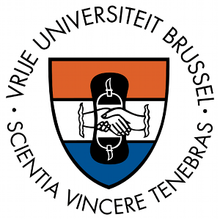
Back جامعة بروكسل الحرة (ناطقة بالهولندية) Arabic الجامعة الحره فى بروكسل ARZ Vrije Universiteit Brussel AST Brüssel Vrije Universiteti Azerbaijani وریج بروکسل بیلیمیوردو AZB Брусельскі вольны ўніверсітэт (1970) Byelorussian Vrije Universiteit Brussel Catalan Vrije Universiteit Brussel / Campus Etterbeek CEB Vrije Universiteit Brussel Czech Vrije Universiteit Brussel German
 | |
| Latin: Universitas Bruxellensis[a][1] | |
| Motto | Scientia vincere tenebras (Latin) |
|---|---|
Motto in English | Conquering darkness through science |
| Type | Independent (partly state-funded) |
| Established | May 28, 1970 |
| President | Karsten De Clerck |
| Rector | Jan Danckaert[2] |
Administrative staff | 3,257 (2017) |
| Students | 19,245 (2020)[3] |
| Address | Pleinlaan 2, 1050 Elsene , , Belgium |
| Campus | Elsene, Jette, Anderlecht and Gooik |
| Follows | Free University of Brussels |
| Colours | |
| Affiliations | University Association Brussels, UNICA, T.I.M.E. |
| Website | www.vub.be/en |
 | |
The Vrije Universiteit Brussel (Dutch, pronounced [ˈvrɛiə ʔynivɛrsiˈtɛid ˈbrʏsəl] ⓘ; lit. Free University of Brussels; abbreviated VUB) is a Dutch- and English-speaking research university in Brussels, Belgium.[b] It has four campuses: Brussels Humanities, Science and Engineering Campus (in Elsene), Brussels Health Campus (in Jette), Brussels Technology Campus (in Anderlecht) and Brussels Photonics Campus (in Gooik).[6]
The Vrije Universiteit Brussel was formed in 1970 by the splitting of the Free University of Brussels[c], which was founded in 1834 by the lawyer and liberal politician Pierre-Théodore Verhaegen. The founder aimed to establish a university independent from state and church, where academic freedom would prevail.[7] This is still reflected in the university's motto Scientia vincere tenebras, or "Conquering darkness through science", and in its more recent slogan Redelijk eigenzinnig, or "Reasonably self-willed". Accordingly, the university is pluralistic – it is open to all students on the basis of equality regardless of their ideological, political, cultural or social background – and it is managed using democratic structures, which means that all members – from students to faculty – participate in the decision-making processes.[d]
The university's research articles are on average more cited than articles by any other Flemish university.[9] The university is organised into 8 faculties that accomplish the three central missions of the university: education, research, and service to the community. The faculties cover a broad range of fields of knowledge including the natural sciences, classics, life sciences, social sciences, humanities, and engineering. The university provides bachelor, master, and doctoral education to about 8,000 undergraduate and 1,000 graduate students.[10]
Cite error: There are <ref group=lower-alpha> tags or {{efn}} templates on this page, but the references will not show without a {{reflist|group=lower-alpha}} template or {{notelist}} template (see the help page).
- ^ "The seal or emblem of the VUB". CAVA - Centrum voor Academische en Vrijzinnige Archieven. Retrieved 5 August 2024.
- ^ "Jan Danckaert named new rector of Vrije Universiteit Brussel". VUB Today. 22 June 2022.
- ^ "De Vrije Universiteit Brussel (VUB) telt dit jaar 8 procent meer studenten dan het jaar voordien. Dit academiejaar zijn 19.245 studenten ingeschreven". Nieuwsblad.be. 23 October 2020.
- ^ Basic VUB house style colours – website of the Vrije Universiteit Brussel
- ^
- "Home – Higher Education in Flanders". Hogeronderwijsregister | The Higher Education Register (in Dutch). Een officiële website van de Vlaamse overheid. Retrieved 13 September 2024.
- "List – Institutions". Hogeronderwijsregister | The Higher Education Register. Een officiële website van de Vlaamse overheid. Retrieved 13 September 2024.
- ^ "Campuses". Vub.ac.be. 2016.
- ^ Witte, Els (1996). Pierre-Théodore Verhaegen (1796–1862) (in Dutch). Brussels: VUB Press. ISBN 90-5487-140-7.
- ^
- "Vrije Universiteit Brussel Organiek statuut" (PDF), Belgisch Staatsblad | Moniteur Belge [Belgian Official Gazette] (in Dutch), 18 September 2018 [Gazetted 8 October 2018] – Via: "Organisatie: Organiek statuut VUB". VUB | Vrije Universiteit Brussel (in Dutch). Retrieved 13 September 2024.
- Organic Statute (PDF), VUB | Vrije Universiteit Brussel, 18 September 2018 Archived 25 June 2023 at the Wayback Machine (in English) – Via: "Organisation – Organisational Charter VUB". VUB | Vrije Universiteit Brussel. Retrieved 13 September 2024.
- Superseded 2005 statute: Organiek Statuut (PDF) (in Dutch), Brussels: Vrije Universiteit Brussel, 2005, archived from the original (PDF) on 29 November 2007, retrieved 23 November 2007
- ^ Visser, M.S.; Rons, N.; Moed, H.; Federhof, A.J. (2003), Bibliometrische Studie van Onderzoeksdisciplines aan de Vrije Universiteit Brussel, 1992–2001, Report commissioned by the Vrije Universiteit Brussel (VUB), Leiden: Centre for Science and Technology Studies, University of Leiden
- ^ Figures from the 2011–2012 Yearly Report of the Vrije Universiteit Brussel: "Activiteitenverslag 2011–2012" (PDF) (in Dutch). Brussels: Vrije Universiteit Brussel. 2012. Archived from the original (PDF) on 4 March 2016. Retrieved 15 August 2013.